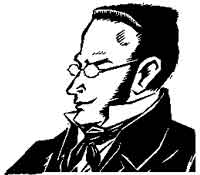Is Zizek Really a Communist?

Zizek—I think—claims to be a communist. Not a party communist, of course, nor even a political communist, but a revolutionary communist. He would like us to place communism within the enlightenment tradition—not the namby-pamby enlightenment tradition of Mandeville, Mill or Rorty, but the bare-knuckled, paroxysmal enlightenment of the French Revolution. Enlightenment as revoution, sure, but revolution in the name of Objective Reason.
Zizek has made a highly entertaining career ridiculing lefty wimps, which could be defined as those who refuse—or better, verdrängen—the violent Kern constitutive both of human society writ large and the human psyche writ small.
In the end, Zizek’s standing as a revolutionary communist rests upon what is perhaps the one commitment that he is clear and consistent about: that history is driven by class struggle, and that class struggle is the only true opposition that is not a displacement or symptom of something else. He embraces the Althusserian paradox: everything is symbolic, but in the end, economics in terms of the class struggle is everything.
I could find many more passages like the following to support this claim:
“Class antagonism, unlike racial difference and conflict, is absolutely inherent to and constitutive of the social field; Fascism displaces this essential antagonism.”(full article here)
Zizek’s communism therefore ultimately rests upon his conviction that class struggle is the only ‘essential antagonism.’ But class struggle figures in Zizek’s thought like trauma in Freud, and the ‘real’ in Lacan.
In keeping with this, his only really clear and consistent commitment, Zizek’s one constant and never-ironic target of attack is the myth and concept of organicism: the idea that somewhere, somehow, at some time and in some way, human individuals and human socieities can be whole. This is, in the langauge of psychoanalysis, the fundamental fantasy, the myth of egoic wholeness as opposed to subjective fracture—and at base, the source of human aggression (hence the struggle). Zizek’s Ideologiekritik could be interpreted, finally, as the attempt to work the acceptance of castration into the political domain, for however disparate and scatter-shot his many polemics seem to be, they all aim to undermine any stable ideological position through sarcastic and irreverent dialectics of parody, mockery and satire.
Perhaps, in my opinion, Zizek’s most interesting thesis—never really stated in any systematic manner, but iterated often throughout his works—is that what binds people together into communities, and equally what binds together an individual person's (fantasy of) identity, is enjoyment. People and peoples differ from one another, form cliques, likes and dislikes, committ violence and atrocity, not from any shared beliefs, or shared values, or shared culture/ethnicity/background—peoples are formed according to what they enjoy. Beliefs and values are in the end--if they are anything relevant to social grouping--just symbols of personal and social economies of enjoyment. You are different than me—why? Not because you believe that The Mummy was an entertaining film, but because you actually enjoyed it. I am not one of you—why? Not because you value suburbia over city, but because you actually enjoy your large house and your long drive-way and your Wendy’s. I'm not a republican--why? Not because of any particular beliefs I have about health-care policy or geo-political strategy, but because I can't begin to imagine what it would feel like to take sincere pleasure in patriotism and a large, waving flag. Jouissance as the ultimate social concept, the primitive that makes sense of all the rest. I am not being insincere when I say that this is possibly be a real scientific insight for the social sciences—even though it needs to be theoretically systematized in a way Zizek has never even begun to try.
But if Zizek’s hails the class struggle, it is within the Lacanian framework of castration and the real. And if he promotes himself as a Marxist, it is against the one notion that animates Marx from his early humanism to the days of Das Kapital: that the class struggle, and therefore social struggle, can be overcome. Nonsense, according to Zizek. The closure, the suture, can never be accomplished, the fantasy must be destroyed, alienation and violence are the consitutive core of human kind, the letter has killed the body—the cause is lost, essentially. And yet, says Zizek, we must fight, struggle, resist, pursue this desire tenaciously to the death—what does this make of Zizek? Obviously—he is no communist, he’s an anarchist.
nice work. fighting a lost cause, but still insistent on fighting it. he 'REAL'ly echoes the statement that philosophers cannot solve anything and he shows the failure hitherto. (the documentary Zizek).
ReplyDeletevery nice your text but i'm sure that you do not understand anything about zizek`s tought
ReplyDeleteMichael you do fairly well up to your turn to enjoyment. Then as you attempt a critique you lose the plot completely.
ReplyDeleteJouissance is not to be translated as plain enjoyment or direct conscious pleasure. It is more like the unspoken/unthought ways in which we "enjoy/persist in" our subjectivity. Zizek is not pointing out your enjoyment or non-enjoyment of The Mummy as some originary basis for your politics. It is precisely the opposite: the political cleavage that constitutes your original symbolic identity (or being) determines the meaning of your enjoyment. To put it another way: you might question what it is you "enjoy" about disliking The Mummy?